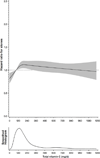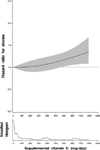Total, Dietary, and Supplemental Vitamin C Intake and Risk of Incident Kidney Stones
- PMID: 26463139
- PMCID: PMC4769668
- DOI: 10.1053/j.ajkd.2015.09.005
Total, Dietary, and Supplemental Vitamin C Intake and Risk of Incident Kidney Stones
Abstract
Background: Previous studies of vitamin C and kidney stones were conducted mostly in men and either reported disparate results for supplemental and dietary vitamin C or did not examine dietary vitamin C.
Study design: Prospective cohort analysis.
Setting & participants: 156,735 women in the Nurses' Health Study (NHS) I and II and 40,536 men in the Health Professionals Follow-up Study (HPFS).
Predictor: Total, dietary, and supplemental vitamin C intake, adjusted for age, body mass index, thiazide use, and dietary factors.
Outcomes: Incident kidney stones.
Results: During a median follow-up of 11.3 to 11.7 years, 6,245 incident kidney stones were identified. After multivariable adjustment, total vitamin C intake (<90 [reference], 90-249, 250-499, 500-999, and ≥1,000mg/d) was not significantly associated with risk for kidney stones among women, but was among men (HRs of 1.00 [reference], 1.19 [95% CI, 0.99-1.46], 1.15 [95% CI, 0.93-1.42], 1.29 [95% CI, 1.04-1.60], and 1.43 [95% CI, 1.15-1.79], respectively; P for trend = 0.005). Median total vitamin C intake for the 500- to 999-mg/d category was ∼700mg/d. Supplemental vitamin C intake (no use [reference], <500, 500-999, and ≥1,000mg/d) was not significantly associated with risk for kidney stones among women, but was among men (HR, 1.19 [95% CI, 1.01-1.40] for ≥1,000mg/d; P for trend = 0.001). Dietary vitamin C intake was not associated with stones among men or women, although few participants had dietary intakes > 700mg/d.
Limitations: Nutrient intakes derived from food-frequency questionnaires, lack of data on stone composition for all cases.
Conclusions: Total and supplemental vitamin C intake was significantly associated with higher risk for incident kidney stones in men, but not in women.
Keywords: Kidney disease; ascorbic acid; calcium oxalate; diet; food-frequency questionnaire (FFQ); gender difference; incident kidney stone; kidney stone formation; nutrition; risk factor; supplements; urinary oxalate excretion; urolithiasis; vitamin C.
Copyright © 2016 National Kidney Foundation, Inc. Published by Elsevier Inc. All rights reserved.
Figures


Comment in
-
Re: Total, Dietary, and Supplemental Vitamin C Intake and Risk of Incident Kidney Stones.J Urol. 2016 Oct;196(4):1170-1. doi: 10.1016/j.juro.2016.07.007. Epub 2016 Jul 13. J Urol. 2016. PMID: 27628804 No abstract available.
References
-
- Borghi L, Schianchi T, Meschi T, et al. Comparison of two diets for the prevention of recurrent stones in idiopathic hypercalciuria. N Engl J Med. 2002;346(2):77–84. - PubMed
-
- Curhan GC, Willett WC, Rimm EB, Stampfer MJ. A prospective study of dietary calcium and other nutrients and the risk of symptomatic kidney stones. N Engl J Med. 1993;328(12):833–838. - PubMed
-
- Curhan GC, Willett WC, Speizer FE, Spiegelman D, Stampfer MJ. Comparison of dietary calcium with supplemental calcium and other nutrients as factors affecting the risk for kidney stones in women. Ann Intern Med. 1997;126(7):497–504. - PubMed
-
- Taylor EN, Curhan GC. Fructose consumption and the risk of kidney stones. Kidney Int. 2008;73(2):207–212. - PubMed
-
- Borghi L, Meschi T, Amato F, Briganti A, Novarini A, Giannini A. Urinary volume, water and recurrences in idiopathic calcium nephrolithiasis: A 5-year randomized prospective study. J Urol. 1996;155:839–843. - PubMed
Publication types
MeSH terms
Substances
Grants and funding
LinkOut - more resources
Full Text Sources
Other Literature Sources
Medical

